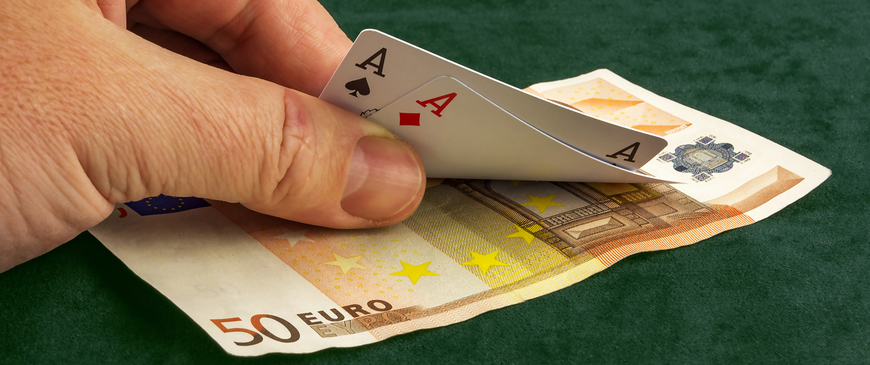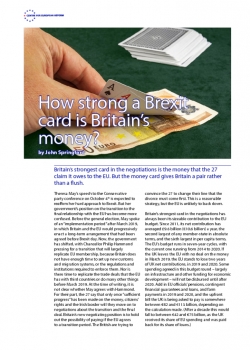
How strong a Brexit card is Britain's money?
Britain’s strongest card in the negotiations is the money that the 27 claim it owes to the EU. But the money card gives Britain a pair rather than a flush.
Theresa May’s speech to the Conservative party conference on October 4th is expected to reaffirm her hard approach to Brexit. But her government’s position on the transition to the final relationship with the EU has become more confused. Before the general election, May spoke of an “implementation period” after March 2019, in which Britain and the EU would progressively enact a long-term arrangement that had been agreed before Brexit day. Now, the government has shifted, with Chancellor Philip Hammond pressing for a transition that will largely replicate EU membership, because Britain does not have enough time to set up new customs and migration systems, or the regulations and institutions required to enforce them. Nor is there time to replicate the trade deals that the EU has with third countries or do many other things before March 2019. At the time of writing, it is not clear whether May agrees with Hammond. For their part, the 27 say that only once “sufficient progress” has been made on the money, citizens’ rights and the Irish border will they move on to negotiations about the transition and the final deal. Britain’s new negotiating position is to hold out the possibility of paying if the EU agrees to a transition period. The British are trying to convince the 27 to change their line that the divorce must come first. This is a reasonable strategy, but the EU is unlikely to back down.
No deal would require the 27 MS to contribute 0.1 per cent of GDP a year more to the EU budget
Britain’s strongest card in the negotiations has always been its sizeable contribution to the EU budget. Since 2011, its net contribution has averaged £9.6 billion (€10.6 billion) a year, the second largest of any member-state in absolute terms, and the sixth largest in per capita terms. The EU’s budget runs in seven-year cycles, with the current one running from 2014 to 2020. If the UK leaves the EU with no deal on the money in March 2019, the EU stands to lose two years of UK net contributions, in 2019 and 2020. Some spending agreed in this budget round – largely on infrastructure and other funding for economic development – will not be disbursed until after 2020. Add in EU officials’ pensions, contingent financial guarantees and loans, and farm payments in 2019 and 2020, and the upfront bill the UK is being asked to pay is somewhere between €82 and €113 billion, depending on the calculation made. (After a decade this would fall to between €42 and €75 billion, as the UK received its share of EU spending and was paid back for its share of loans.)
Rather obviously, these are very large sums of money. But it does not follow that no deal would lead to much fiscal pain for the 27. The hole in the budget would have to be met by member-states which are net payers and those that are net recipients paying more. The simplest way of filling the hole in the budget would be to divide the UK’s net contribution in proportion to the size of each remaining member-state’s economy. This would mean that each member-state would have to contribute 0.1 per cent of GDP more to the EU budget annually, until the UK share of the EU’s current liabilities were paid off. Officials in Brussels say that, in the event of no deal, they could spread any extra payments by member-states over time, and they might also choose to bear down on future expenditure.
Compare that to the fiscal cost of no deal for the UK. It would save 0.4 per cent of GDP by ending payments and receipts from the EU budget. But, according to the Office of Budget Responsibility, the UK’s budget watchdog, Britain’s economy would only have to shrink by 0.6 per cent as a result of Brexit for that fiscal gain to be wiped out, because tax revenues would fall. Most credible forecasts estimate that the hit from Brexit would be far higher than this, with the consensus in the 3 to 6 per cent range if the UK traded with the EU on WTO terms only. No deal would therefore lead to a big hole in Britain’s public finances – and one that is far larger than the losses that the 27 member-states would incur.
Of course, the political danger that Theresa May would face if she walked out of talks would not simply be fiscal. No deal would lead to chaos at the UK’s ports and on the Irish border, as the EU would impose tariffs and other customs checks on UK exports. There would be huge legal uncertainty over whether British goods and services could be sold in the 27. This would almost certainly result in a recession – and one that would have been inflicted by May’s failure to negotiate a deal. It is hard to imagine the prime minister – or her government – surviving that outcome.
It should be obvious, then, that the UK is in a far weaker position to dictate the terms of the divorce – and the sequencing of talks – than the 27. And the 27 have some powerful reasons to stick to their ‘divorce first’ red line.
Many in the 27 think UK should pay additional money for single market membership during the transition
The first reason is that, while the money is ultimately a weak card, it is Britain’s strongest card. This is why the EU was insistent on sequencing: they did not want the UK to use the money as leverage at every stage of the negotiations. Michel Barnier does not want to agree a final sum before declaring sufficient progress, but he does want an accord on a methodology for calculating the final bill. Once that is nailed down, then an approximate amount will have been agreed. And it will be difficult for the UK to negotiate that sum downwards in the final stages of the negotiations, because the deadline will be near and the pressure to agree will be intense.
That leads us to the second reason: the longer the UK eats into the two-year Article 50 period by haggling over the divorce bill, the less time there will be to outline the future relationship and the transition. As the deadline approaches, the 27’s negotiating power grows, because a fall from the cliff-edge would hurt Britain more than them. The UK would come under increasing pressure to agree on the money, and to accept an off-the-shelf transition deal, without ‘implementation arrangements’ that allow it to, say, go and negotiate new trade deals while continuing to apply the EU’s Common External Tariff on imports; or to place some restrictions on free movement during the transition phase. The EU would much prefer Britain to continue to apply all of the EU’s rules and remain subject to all of its institutions, including the ECJ, during a transition. And many in the 27 think that Britain should pay additional money – beyond its share of existing EU budgetary commitments – for membership of the single market during a transition.
The British government hopes that, by going around Barnier and making overtures to France, Germany and other member-states, they might help Theresa May get out of a horrible political fix. If she pays the Brexit bill without anything to show for it, she might be vulnerable to a leadership challenge, raising the risk that Britain crashes out. The 27 might be moved to help, despite the hectoring and insulting tone that many Brexiters in her party have adopted.
But it would be as much an act of charity as self-interest.
John Springford is director of research at the Centre for European Reform.


Comments
I worked in the financial markets for many years. My critetia for judging Brexit is purely on an economic basis. I ask, ‘Can I see any way the UK will be better off as a result of leaving the EU’? Given all the evidence we now have?
The resounding answer is No!